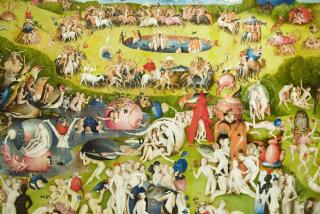The Origin of Species
- Share via
“These are the instruments of sex outdoors. You need good weather, somewhere dry to stretch out far from dogs and wasps, and no sense of the ridiculous.” No matter that they were a pair of homely zoologists at the uglier end of their 50s, Joseph and Celice had the good fortune of a sunny Tuesday with no classes to teach and a stretch of dune above Baritone Bay, empty of canine and insect witness to their middle-aged pleasure. Lucky enough not to see their murderer, Joseph and Celice were unaware of the petty thief armed with a handful of granite, and so died within the lissom grass and sand, Joseph’s hand grasping Celice’s ankle, with no sense of the ridiculous.
These are the instruments of Jim Crace’s latest novel, “Being Dead.” And although the matter-of-fact delivery smacks of Patricia Highsmith and the zoo-philosophical detail smells like Samuel Beckett, Crace (whose last novel, “Quarantine,” was short-listed for the Booker Prize) has crafted an original--an exquisitely gentle and unsentimental tale on the evolution of love.
Crace’s lovers, stumbling over the dunes, eating careless sandwiches after equally sloppy sex, are certainly not matinee models destined to give Jude Law and Gwyneth Paltrow cinematic inspiration. Eighteen months older than Joseph, Celice is also more aggressive and taller than her husband, small-breasted, thin-waisted and large-thighed, with “the figure of a pigeon or a pear.” Joseph’s attraction is hidden away in his larynx. “Singing was his greatest eloquence. It went through walls. How could the other men compete with such a voice? What was the benefit in being tall and handsome if they couldn’t be admired through wooden panels, or at night?”
It had been 30 years since the night when Joseph’s voice first penetrated a wall and found Celice. They had been thrown together, all those years ago, with four other young biologists and oceanographers into a tiny study house, for a vacation of research and adventure. Celice and the flirty Festa slept, or tried to sleep, in sleeping bags on the veranda, that first night in the house, while Joseph’s three beery comrades joked and belched in the bunkroom. Unable to sleep, Celice had reached the heights of annoyance when Joseph banged in from the beach. But slowly something within her loosened. “Someone, not drunk, was crooning a sugar ballad, the kind her uncle used to sing when she was small enough to be rocked to sleep. This someone had a voice as grandly sentimental as the song. It dipped and peaked as Celice herself dipped and peaked in her warm bag.”
Between these two fleeting acts of half-realized sex, Crace weaves a story that ebbs and flows with a suggestion that, somewhere within the 30 years, between the original encounter and the final death, lies an explanation for the lives of these two students of animal behavior. There are careers, half-formed. He rises from his student days studying sprayhoppers--tiny sea-crickets that bounce on the waves until they are drowned or devoured--to direct the Tidal Institute. She never moves above part-time tutor at the university. They make few friends, share few interests. There is a daughter, half-cared for and half-caring, who has debunked to a career of waitressing and avoiding the disappointment of her parents. There is even an early death--one of their fellow students is destined never to have career, children or disappointments.
And there are the elemental forces--the rain, the sun, the beasts of the field and the beasts of the air--that work upon the dead bodies of the couple during the five days they lie undiscovered within the sound of Baritone Bay. At first beetles, crabs, a gull. “The flies lined up like fishermen along the banks of the bodies’ open wounds.” And slowly, the two human animals evolve into mulch. “Joseph, like most zoologists, had been a faculty snob and hated botany. He thought the ‘plant men’ lived a lesser life. He was the huntsman to their gatherers. Their only weapons were the plastic bag and trowel. But he was closer now to botany than he had ever been. His greater, living predators had gone, but the longer blades of lissom grass, gasping for the light, were bending over him like nurses. His body was a vegetable, skin and pulp and fibre. His bones were wood. Soon, if no one came to help, the maggots would dismantle him. Then his body could only be gathered up by trowels and put in plastic bags.”
It is entirely to Crace’s credit that he narrates the evolution of Joseph and Celice with a tidal reluctance to move in any one direction for too long. None of the forces explain their final moments. Not even their chance return on a sunny day to the site of their first love provides a satisfying evolutionary link to the necessary chain of their lives. Their lives, it seems, are as simple and inexplicable as their deaths. And yet there is that signal image preserved in death: “ . . . his hand was touching her, the grainy pastels of her skin, one fingertip among her baby ankle hairs. Their bodies had expired, but anyone could tell--just look at them--that Joseph and Celice were still devoted.”
“Ah, yes,” Joseph pondered in the halcyon days of their early courtship, blowing warm mist onto one of his beloved sprayhoppers, “That’s what evolution has been for, to keep the zoologists happy.” These thoughts and observations are the instruments of a highly-evolved novelist, an active, living anatomist of love.
More to Read
Sign up for our Book Club newsletter
Get the latest news, events and more from the Los Angeles Times Book Club, and help us get L.A. reading and talking.
You may occasionally receive promotional content from the Los Angeles Times.









